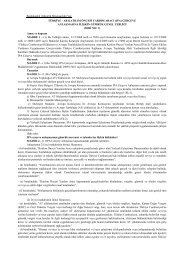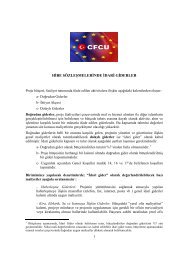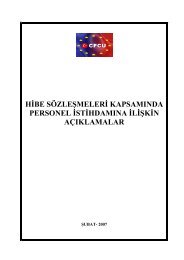Project Cycle Management Training Handbook - CFCU
Project Cycle Management Training Handbook - CFCU
Project Cycle Management Training Handbook - CFCU
You also want an ePaper? Increase the reach of your titles
YUMPU automatically turns print PDFs into web optimized ePapers that Google loves.
68<br />
<strong>Project</strong> <strong>Cycle</strong> <strong>Management</strong> <strong>Training</strong> <strong>Handbook</strong><br />
7.5 Summary<br />
� Evaluation can be defined as a periodic assessment of the<br />
relevance, efficiency, effectiveness, impact, economic and<br />
financial viability, and sustainability of a project in the context of<br />
its stated objectives.<br />
� The purpose of evaluation is to review the achievements of a<br />
project against planned expectations, and to use experience from<br />
the project to improve the design of future projects and<br />
programmes.<br />
� The EU uses the following criteria: Relevance; Efficiency;<br />
Effectiveness; Impact; Economic & financial viability; and<br />
Sustainability<br />
� The approach adopted by many agencies, including the European<br />
Commission, is to programme formal evaluation reports at<br />
specific phases in the project cycle and to supplement these with<br />
ad hoc studies. The specific reports would typically be:<br />
Add your own notes here…<br />
- At Mid-Term, to review progress and propose alterations to<br />
project design during the remaining period of implementation.<br />
- At <strong>Project</strong> Completion, to document the resources used, results<br />
and progress towards objectives. The objective is to generate<br />
lessons about the project which can be used to improve future<br />
designs.





